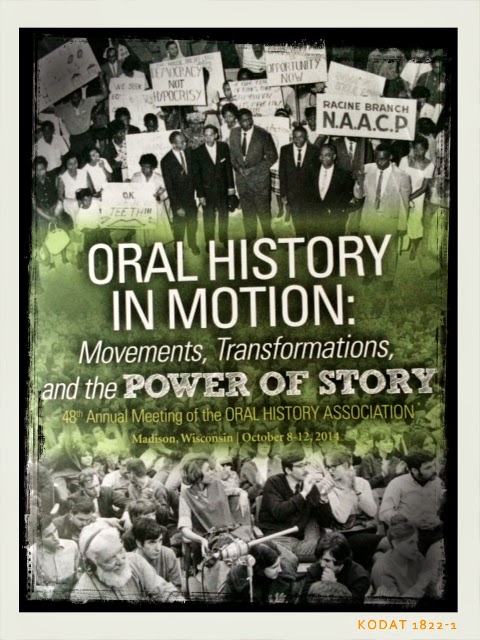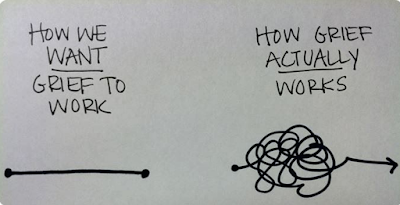Fun Home Follow-Up
A few posts back, I wrote about teaching Alison Bechdel's Fun Home for the first time. I thought I'd follow up with a few reflections on how that went.
I love students' honesty. Jabari commented as soon as we opened up the conversation that while he had originally had no intention of reading the book ("I was just going to read a summary",) he got engrossed and actually read it. There were lots of nodding heads. Aside from the whole, "I have no shame about telling you that I consider the syllabus purely as a set of vague recommendations," I considered it a win. Fun Home had them hooked.
And then there's the motley band of students. Of course, the debate began immediately with whether or not the dad had committed suicide. One student had spent eight years working in a funeral home and was adamant that a professional in the business would never choose a death as "messy" as getting run over by a truck. "He never would have done that. Plus he was all about aesthetics and that is seriously not an aesthetically-pleasing way to go."
Of course, they had a difficult time separating remembrance from "what happened." I had a feeling they were going to and tried to find some ways into that. One way was through the rest of the family. The absence of the brothers made for good conversation. We had a great conversation about the mom, about her creativity, determination, intelligence on the one hand and the fact of her being cowed by her life on the other.
A lot of them reacted strongly to the scene in the book in which she was being lambasted and berated for not following directions -- when it was clear in retrospect, there were much more emotionally fraught things going on. But it was really important to remind them that they were experiencing this event (vicariously) as it was filtered through memory. What Alison remembered happening is, of course, very much about Alison and her relationship with her mom, as much or more than it is about her parents' history.
This led to an interesting conversation about parents -- both as the shapers of our history and the vehicles for self-actualization through separation from our childhood images of them. I was pretty impressed by my students' discussion about the text as a means of owning that process of separation, of coming to terms with being an adult by coming to terms with parents as humans with frailties and imperfections. They EVEN got the whole parents as gods inference with Daedelus! Yea!
I also loved that they really understood how landscapes and places of memory factored into the storytelling. A few of them spent a lot of time looking at the maps, the sites of memory, the beautiful and powerful juxtapositions of poetry and literature with landscapes of the PA community within which the text takes place. They also really got the "so close" aspect of Germany/Europe --- I think some of them identified with wanting to leave and to be liberated from the identities we grow into as members of rooted communities but with being pulled back by circumstances into a web of relationships to one's home place.....
And I know we all keep saying it, but I want to keep noticing how fluid and open my north-shore-of-Boston working-to-middling class students' conceptions of gender and sexuality are. They just are way better at this than adults. People talked about their own sexuality pretty openly, they talked about Alison's adventures in love with a kind of affection for her character that felt honest and connected. They talked about the "dark, dark history" of people having to be closeted.
It was a really good discussion. And I followed up with an assignment that asked them to do some thinking about how they connect with the past, through what means, to what ends, etc. using Bechdel and more theoretical writers on memory. They just handed them in. We shall see!
I love students' honesty. Jabari commented as soon as we opened up the conversation that while he had originally had no intention of reading the book ("I was just going to read a summary",) he got engrossed and actually read it. There were lots of nodding heads. Aside from the whole, "I have no shame about telling you that I consider the syllabus purely as a set of vague recommendations," I considered it a win. Fun Home had them hooked.
And then there's the motley band of students. Of course, the debate began immediately with whether or not the dad had committed suicide. One student had spent eight years working in a funeral home and was adamant that a professional in the business would never choose a death as "messy" as getting run over by a truck. "He never would have done that. Plus he was all about aesthetics and that is seriously not an aesthetically-pleasing way to go."
Of course, they had a difficult time separating remembrance from "what happened." I had a feeling they were going to and tried to find some ways into that. One way was through the rest of the family. The absence of the brothers made for good conversation. We had a great conversation about the mom, about her creativity, determination, intelligence on the one hand and the fact of her being cowed by her life on the other.
A lot of them reacted strongly to the scene in the book in which she was being lambasted and berated for not following directions -- when it was clear in retrospect, there were much more emotionally fraught things going on. But it was really important to remind them that they were experiencing this event (vicariously) as it was filtered through memory. What Alison remembered happening is, of course, very much about Alison and her relationship with her mom, as much or more than it is about her parents' history.
This led to an interesting conversation about parents -- both as the shapers of our history and the vehicles for self-actualization through separation from our childhood images of them. I was pretty impressed by my students' discussion about the text as a means of owning that process of separation, of coming to terms with being an adult by coming to terms with parents as humans with frailties and imperfections. They EVEN got the whole parents as gods inference with Daedelus! Yea!
I also loved that they really understood how landscapes and places of memory factored into the storytelling. A few of them spent a lot of time looking at the maps, the sites of memory, the beautiful and powerful juxtapositions of poetry and literature with landscapes of the PA community within which the text takes place. They also really got the "so close" aspect of Germany/Europe --- I think some of them identified with wanting to leave and to be liberated from the identities we grow into as members of rooted communities but with being pulled back by circumstances into a web of relationships to one's home place.....
And I know we all keep saying it, but I want to keep noticing how fluid and open my north-shore-of-Boston working-to-middling class students' conceptions of gender and sexuality are. They just are way better at this than adults. People talked about their own sexuality pretty openly, they talked about Alison's adventures in love with a kind of affection for her character that felt honest and connected. They talked about the "dark, dark history" of people having to be closeted.
It was a really good discussion. And I followed up with an assignment that asked them to do some thinking about how they connect with the past, through what means, to what ends, etc. using Bechdel and more theoretical writers on memory. They just handed them in. We shall see!









Beautiful.
ReplyDeleteLast year, I had my World History students read Luong Ung's First They Killed My Father, and we dealt with the question of memory and the filtering process, especially in light of the historical record of the genocide (which I provided in class) and the remembrances of other Cambodian survivors who disagreed with Ung's perspective. I was pleasantly surprised by their take on this, especially when they noticed that Ung was 5 years old when the Khmer Rouge took power, but she wrote the book in her 30s, and what that might mean for her memory.
ReplyDelete